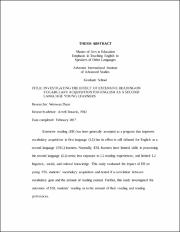| dc.description.abstract | Extensive reading (ER) has been generally accepted as a program that improves vocabulary acquisition in first language (L1) but its effect is still debated for English as a second language (ESL) learners. Normally, ESL learners have limited skills in processing the second language (L2) texts; less exposure to L2 reading experiences; and limited L2 linguistic, social, and cultural knowledge. This study evaluated the impact of ER on young ESL students’ vocabulary acquisition and tested if a correlation between vocabulary gain and the amount of reading existed. Further, this study investigated the outcomes of ESL students’ reading as to the amount of their reading and reading preferences.
This study employed a quasi-experimental design. The 45 ESL participants were 3rd to 6th graders from a private primary school in the Philippines. During the 10-week ER program, 23 students in the experimental group were required to read at least 10 minutes and learn 2 new words from Monday to Thursday. The control group functioned as a comparison group and received no instruction. The Vocabulary Size Test, reading habit questionnaires, and reading logs were the research instruments used to answer 3 research questions.
After the data collection, the pretest and posttest scores were compared using independent samples t test, paired samples t test, and Pearson’s correlation test. Results showed a non-significant difference between the 2 groups regarding the vocabulary gain. Moreover, results showed no correlation relationship between vocabulary gain and the amount of time in reading, but the results might be affected by the incomplete and inaccurate data from reading logs. Nevertheless, this research found that students read more often when suitable reading materials were provided, so ER still played an important role to nurture students’ attitude towards reading and might consolidate known words that were learned through explicit vocabulary instruction. In the end, suggestions for teachers, parents, and future researchers were offered. | en_US |

